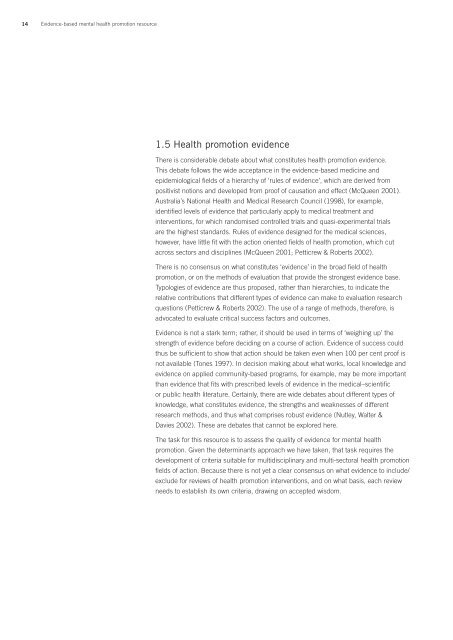<strong>Evidence</strong>-<strong>based</strong> <strong>mental</strong> <strong>health</strong> <strong>promotion</strong> <strong>resource</strong>13Electronic databases, reference lists and the ad<strong>vic</strong>e of an expert panel were alsoused to identify relevant reviews. This process highlighted that understandings of thedeterminants of <strong>mental</strong> <strong>health</strong>, policies and programs for <strong>mental</strong> <strong>health</strong> <strong>promotion</strong>,and methods of evaluation are broad and diverse but yet to be suitably indexed. Inother words, databases are not sensitive to <strong>health</strong> <strong>promotion</strong> terms, the determinantsof <strong>health</strong> or <strong>mental</strong> <strong>health</strong> <strong>promotion</strong>. Nonetheless, our search strategy revealed a wideranging evidence base. Given the breadth of the evidence on a determinants of <strong>health</strong>approach to <strong>mental</strong> <strong>health</strong> and wellbeing, this <strong>resource</strong> is not a systematic review of allrelevant studies.1.3 Health <strong>promotion</strong> contextHealth <strong>promotion</strong> is often said to be everybody’s business. In other words, the<strong>promotion</strong> of people’s <strong>health</strong> is a universal concern, understood and supported asrequiring multi-level, multi-sector spheres of action. This <strong>resource</strong> is consistent with<strong>health</strong> <strong>promotion</strong>’s universal principles, policies and practices, and its principleframework, the Ottawa Charter for Health Promotion (Appendix B), which takes adeterminants approach to <strong>health</strong> <strong>promotion</strong>.1.4 Understanding <strong>mental</strong> <strong>health</strong> <strong>promotion</strong>Mental <strong>health</strong> <strong>promotion</strong> is underpinned by understandings of what constitutes <strong>mental</strong><strong>health</strong>, but it is often defined at the level of individuals rather than community orpopulation levels. Mental <strong>health</strong> <strong>promotion</strong> is frequently located in broad <strong>health</strong> andsocial development work, and distinguishes population-wide <strong>mental</strong> <strong>health</strong> <strong>promotion</strong>from the early intervention and prevention strategies of the <strong>mental</strong> illness movement.If a determinants approach is taken to defining <strong>mental</strong> <strong>health</strong> <strong>promotion</strong>, then it isnecessary to recognise the importance to <strong>mental</strong> <strong>health</strong> of ensuring people can developthe capacity to adapt to, respond to and/or control life’s challenges and changes, andhave the necessary <strong>resource</strong>s to act on the circumstances that determine their <strong>mental</strong><strong>health</strong> and wellbeing.Consistent with <strong>health</strong> <strong>promotion</strong> generally, <strong>mental</strong> <strong>health</strong> <strong>promotion</strong> actions need tobe multi-level and intersectoral, and concerned with systems change, policy and thedevelopment of evidence about what population-<strong>based</strong> programs work. A key messagefor practitioners is that the inclusion in general <strong>health</strong> <strong>promotion</strong> programs, of <strong>mental</strong><strong>health</strong> <strong>promotion</strong> outcomes, will enhance their ability to achieve equity and tackleinequities (Mittelmark 2003; Tilford, Delaney & Vogels 1997). Equity-related outcomesare central to the Ottawa Charter for Health Promotion.Definitions of <strong>mental</strong> <strong>health</strong>Mental <strong>health</strong> is a state of wellbeing inwhich the individual realises his or her ownabilities, can cope with the normal stressesof life, can work productively and fruitfully,and is able to make a contribution to his orher community (WHO 2001,p 1).Mental <strong>health</strong> is the embodiment of social,emotional and spiritual wellbeing. Mental<strong>health</strong> provides individuals with the vitalitynecessary for active living, to achieve goalsand to interact with one another in waysthat are respectful and just (VicHealth2005b, p 7).Definition of <strong>mental</strong> illness and <strong>mental</strong>disordersIn this <strong>resource</strong>, the term ‘<strong>mental</strong> disorders’is used rather than ‘<strong>mental</strong> illness’. Butas this VicHealth (2005a, p. 1) definitionmakes clear, the two terms refer to differentspectrums:Mental illness is a diagnosable disorderthat significantly interferes with anindividual’s cognitive, emotional and/orsocial abilities. Mental disorders are ofdifferent types and different degreesof severity.Definition of <strong>mental</strong> <strong>health</strong> <strong>promotion</strong>Mental <strong>health</strong> <strong>promotion</strong> contributes togeneral <strong>health</strong> <strong>promotion</strong> by taking actionto ensure social conditions and factorscreate positive environments for the good<strong>mental</strong> <strong>health</strong> and wellbeing of populations,communities and individuals. Mental <strong>health</strong><strong>promotion</strong> requires action to influencedeterminants of <strong>mental</strong> <strong>health</strong> and addressinequities through the implementation ofeffective multi-level interventions across awide number of sectors, policies, programs,settings and environments.
14 <strong>Evidence</strong>-<strong>based</strong> <strong>mental</strong> <strong>health</strong> <strong>promotion</strong> <strong>resource</strong>1.5 Health <strong>promotion</strong> evidenceThere is considerable debate about what constitutes <strong>health</strong> <strong>promotion</strong> evidence.This debate follows the wide acceptance in the evidence-<strong>based</strong> medicine andepidemiological fields of a hierarchy of ‘rules of evidence’, which are derived frompositivist notions and developed from proof of c<strong>au</strong>sation and effect (McQueen 2001).Australia’s National Health and Medical Research Council (1998), for example,identified levels of evidence that particularly apply to medical treatment andinterventions, for which randomised controlled trials and quasi-experi<strong>mental</strong> trialsare the highest standards. Rules of evidence designed for the medical sciences,however, have little fit with the action oriented fields of <strong>health</strong> <strong>promotion</strong>, which cutacross sectors and disciplines (McQueen 2001; Petticrew & Roberts 2002).There is no consensus on what constitutes ‘evidence’ in the broad field of <strong>health</strong><strong>promotion</strong>, or on the methods of evaluation that provide the strongest evidence base.Typologies of evidence are thus proposed, rather than hierarchies, to indicate therelative contributions that different types of evidence can make to evaluation researchquestions (Petticrew & Roberts 2002). The use of a range of methods, therefore, isadvocated to evaluate critical success factors and outcomes.<strong>Evidence</strong> is not a stark term; rather, it should be used in terms of ‘weighing up’ thestrength of evidence before deciding on a course of action. <strong>Evidence</strong> of success couldthus be sufficient to show that action should be taken even when 100 per cent proof isnot available (Tones 1997). In decision making about what works, local knowledge andevidence on applied community-<strong>based</strong> programs, for example, may be more importantthan evidence that fits with prescribed levels of evidence in the medical–scientificor public <strong>health</strong> literature. Certainly, there are wide debates about different types ofknowledge, what constitutes evidence, the strengths and weaknesses of differentresearch methods, and thus what comprises robust evidence (Nutley, Walter &Davies 2002). These are debates that cannot be explored here.The task for this <strong>resource</strong> is to assess the quality of evidence for <strong>mental</strong> <strong>health</strong><strong>promotion</strong>. Given the determinants approach we have taken, that task requires thedevelopment of criteria suitable for multidisciplinary and multi-sectoral <strong>health</strong> <strong>promotion</strong>fields of action. Bec<strong>au</strong>se there is not yet a clear consensus on what evidence to include/exclude for reviews of <strong>health</strong> <strong>promotion</strong> interventions, and on what basis, each reviewneeds to establish its own criteria, drawing on accepted wisdom.



